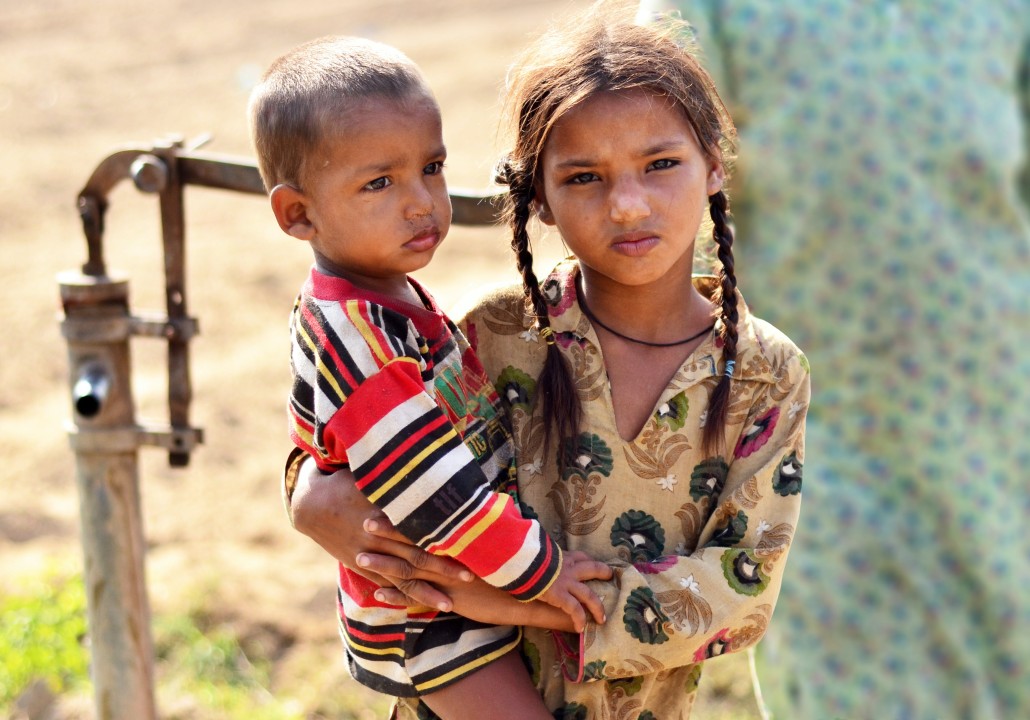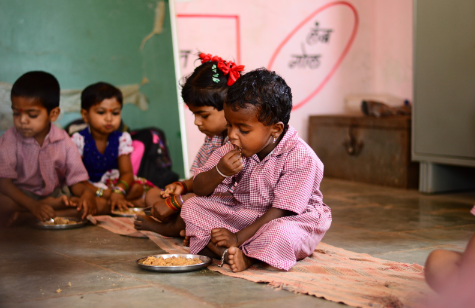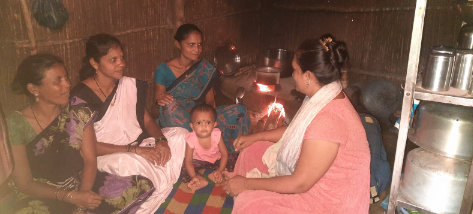Harmonizing CSR and ESG: A Holistic Approach to Tackling Child Malnutrition
In India, the specter of child malnutrition looms large, casting a long shadow over the future of our nation. The enormity of this issue is not just a matter of statistical analysis but a call to action for everyone.

Child malnutrition in India is a complex issue that extends far beyond the mere lack of food. It’s a crisis deeply rooted in various socio-economic factors that collectively contribute to the nutritional deficiencies in children.
Firstly, the socio-economic conditions play a pivotal role. Poverty and low household income directly impact a family’s access to nutritious food. In many cases, even if food is available, it might not meet the necessary dietary requirements for healthy growth in children.
Moreover, impoverished communities often lack the necessary awareness about nutritional needs, leading to a cycle of malnutrition that transcends generations.
Secondly, healthcare access and education are critical components in addressing child malnutrition. Limited access to healthcare means that many children suffer from illnesses that exacerbate nutritional deficiencies, such as diarrheal diseases or worm infestations.
These health issues, often due to poor sanitation and lack of clean water, significantly impact a child’s ability to absorb nutrients. Furthermore, education plays a dual role.

It empowers parents, especially mothers, with knowledge about proper nutrition, essential for making informed dietary choices for their children. Additionally, educated parents are more likely to understand and seek healthcare services, creating a healthier environment for their children.
Environmental sustainability also plays a crucial role. The degradation of the environment, climate change, and loss of biodiversity can lead to food insecurity and affect the availability of diverse and nutritious food.
This challenging aspect points to the need for sustainable agricultural practices and food systems to support the growing population’s nutritional needs, especially for vulnerable children.
The Holistic approach
To deeply understand the holistic approach needed to tackle child malnutrition in India, it’s essential to delve into each aspect of this comprehensive strategy:

Solutions:
Comprehensive Nutritional Support: Providing food is the first step, but it’s vital to ensure that this food is nutritionally complete. This means a diet that includes all the necessary macronutrients (proteins, fats, carbohydrates) and micronutrients (vitamins and minerals) essential for a child’s growth and development. A balanced diet supports physical health, cognitive development, and disease resistance.
Improving Socio-Economic Conditions: Malnutrition is often a symptom of deeper socio-economic issues. Poor living conditions, lack of income, and unemployment can limit a family’s access to nutritious food. Addressing these conditions requires economic interventions such as job creation, skill development programs, and financial support for impoverished families. Ensuring household economic stability directly contributes to better nutritional choices and food security.
Enhanced Healthcare Access: Regular health check-ups, vaccinations, and medical care are crucial in preventing and treating conditions that can arise from or exacerbate malnutrition, such as infections and parasitic diseases. This also includes maternal healthcare, as the health of a mother significantly impacts the nutrition and health of her child. Access to healthcare is essential for early identification and intervention in cases of malnutrition.
Education and Awareness: Educating communities about the importance of nutrition can have a transformative effect. Knowledge about healthy eating practices, understanding the nutritional needs of children at different developmental stages, and knowing how to prepare balanced meals are all crucial. This education should extend to schools, where children can learn about nutrition and develop healthy eating habits from a young age.
Promoting Environmental Sustainability: The environment plays a significant role in nutrition. Clean water, sanitation, and pollution directly impact food safety and health. Sustainable agricultural practices ensure a continuous supply of fresh, nutritious food and protect the environment. This involves supporting local farming, reducing food waste, and encouraging environmentally friendly farming practices.

Breaking the Cycle of Malnutrition: A holistic approach aims to provide immediate relief and create sustainable change. This includes empowering communities to grow and prepare nutritious food, developing local solutions for food security, and implementing long-term policies prioritizing nutrition and health. By addressing the root causes of malnutrition, such strategies work towards eradicating this issue for future generations.
In conclusion, a holistic approach to tackling child malnutrition in India involves an integrated strategy that combines nutritional support, socio-economic improvements, healthcare access, education, and environmental sustainability. This multifaceted approach aims to address the root causes of malnutrition, ensuring that children receive the necessary nutrients for healthy growth and development and breaking the cycle of malnutrition for generations to come.
At ANNADA,
We focus on three core pillars: Nutrition Adequacy, Nutrition Awareness, and Nutrition Advocacy.
Nutrition Adequacy: Our main goal is to ensure that children under six receive adequate nutrition. This involves not only providing meals but ensuring these meals are rich in essential nutrients necessary for healthy growth and development. We collaborate with local communities, leveraging resources and knowledge to create sustainable food systems.

Nutrition Awareness: Knowledge is power. Educating families, especially mothers, about the importance of nutrition and healthy eating practices empowers them to make informed decisions about their children’s diet. Our awareness campaigns are tailored to local needs and cultures, ensuring they are relevant and impactful
Nutrition Advocacy: We believe in the power of policy change to create a long-lasting impact. Our advocacy efforts are aimed at influencing policy at both local and national levels to prioritize child nutrition. We work with various stakeholders, including government bodies, to push for policies supporting nutrition programs and addressing the root causes of malnutrition.
In conclusion, the fight against child malnutrition in India is a battle that cannot be won in silos. It requires the collective effort of the CSR and ESG communities, working in tandem with organizations like ours. By adopting a holistic approach, we can not only feed but nourish the future of our nation. We invite you to join us in this crucial mission to turn the tide against child malnutrition and light the path to a healthier, brighter future for India’s children.
In corporate social responsibility (CSR) and environmental, social, and governance (ESG) initiatives, few challenges are as urgent and interconnected as child malnutrition. This pervasive issue affects the health and well-being of millions of children worldwide and has far-reaching implications for sustainable development goals (SDGs) and national agendas. In this blog, we delve into the critical importance of addressing child malnutrition within the framework of CSR and ESG, highlighting how such efforts can contribute to broader societal and corporate objectives.
Child malnutrition, characterized by inadequate nutrition, poses a significant barrier to individual and societal development. The consequences extend beyond immediate health concerns to encompass economic ramifications, educational disparities, and social inequalities. According to the World Health Organization (WHO), malnutrition contributes to nearly half of all deaths in children under the age of five globally, reflecting not only a health crisis but also a systemic failure in addressing basic human needs.
At the heart of CSR lies the commitment of businesses to operate ethically and responsibly, acknowledging their impact on society and the environment. Similarly, ESG principles guide companies in integrating sustainability considerations into their operations, fostering long-term value creation for stakeholders. However, the nexus between CSR, ESG, and child malnutrition must be addressed.
One key takeaway from this discussion is understanding how alleviating child malnutrition can catalyze achieving broader CSR objectives, including ESG alignment and the pursuit of SDGs. By investing in initiatives aimed at combating malnutrition, companies can simultaneously address multiple dimensions of sustainability, such as health and well-being (SDG 3), quality education (SDG 4), gender equality (SDG 5), and sustainable communities (SDG 11).
Moreover, tackling child malnutrition aligns with national development priorities, particularly in low- and middle-income countries where the burden of malnutrition is most acute. Governments often face resource constraints in addressing complex social challenges, making partnerships with the private sector indispensable. Through collaborative efforts, companies can leverage their expertise, resources, and networks to support national nutrition programs, thereby amplifying the impact of CSR initiatives.
Furthermore, addressing child malnutrition can yield tangible business benefits, enhancing corporate reputation, mitigating risks, and fostering innovation. For instance, companies that prioritize employee health and well-being are likely to experience higher productivity, lower absenteeism, and greater employee satisfaction. Similarly, investments in community health programs can contribute to building resilient supply chains and enhancing brand loyalty among consumers.
Harmonizing CSR and ESG efforts with the imperative of tackling child malnutrition represents a holistic approach to sustainable development. By recognizing the interconnectedness of social, environmental, and economic factors, businesses can drive positive change that transcends organizational boundaries. As we strive towards a more inclusive and equitable future, let us recognize the transformative power of addressing child malnutrition in achieving larger CSR objectives and advancing the common good.
Together, through concerted action and shared commitment, we can build a world where every child has the opportunity to thrive, unencumbered by the scourge of malnutrition. Let this be our collective legacy—a testament to the enduring impact of corporate responsibility and the promise of a brighter tomorrow for generations to come









